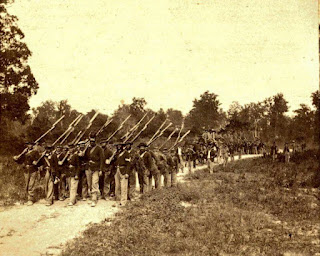When someone is given the frustrating job of getting a large group of people to work together to accomplish a singular assignment, there is a commonly used expression to describe the experience, "It's like trying to herd cats." Cats are not known for being the most cooperative animals. They tend to be very independent, and like to go their own way, usually scattering in all directions. Felines do not move smoothly along like a herd of cattle. Now try to imagine a herdsman attempting to move a herd of a thousand cats from one place to another. Can you see it? Crazy cats running every which way. Cats going in every direction, except the direction the herdsman wanted them to go. Pure Chaos!
Now again try to imagine the task that General George McCellan faced when President Lincoln appointed him General in Chief of the entire Union Army. He inherited a huge untrained, undisciplined, demoralized army, fresh from a defeat in their first encounter with the Confederate rebels. A battle that most expected the Union to easily win. What now? Just to get hundreds of raw recruits to march in unison would be the first simple order of business. Not many generals would have been up to such an assignment delegated to them. A few men when faced with such difficulties would have considered giving up, and just make peace and go home. The job is too difficult. Thankfully, for the Union they not only had a strong willed general in charge, but a determined President and a determined Nation to push through the great challenges ahead.
I'm sure anyone in Church leadership can relate. In the Scriptures, the people of God are often referred to as Sheep. But, more often than not, Christ's disciples act more like cats than sheep, running in every different direction, rather than moving together. It is a daily challenge to corral independent, opinionated, talented, but busy Christian people together. As I said in the beginning, it can be frustrating being a leader. If I had lived Two Thousand years ago, and a man had come up with the idea of the Church, and its success would be dependent on people working in unity together, I would have cynically said, "It will never work. People!, working unselfishly together? No Way!" It would be as successful as trying to herd cats.
But, It was not a man's idea. It was God's.
The work of the Kingdom, and the success of the Church, is not totally dependent on Man. Jesus is the Good Shepherd. "I AM the Good Shepherd, and the sheep hear My voice... and they follow Me."
John 10:1-4
He knows how to herd cats. Thank God.
Two Thousand years later, the Church has reached every corner of the globe, and billions of people, people of every tongue and nation, know His story. He definitely knows how to get "cats" working together and moving in the same direction.
Christ proclaimed, "I will build My Church, and the gates of hell will not stop it." (Matt. 16:18)
And crazy cats can't stop it either.
Christ proclaimed, "I will build My Church, and the gates of hell will not stop it." (Matt. 16:18)
And crazy cats can't stop it either.

